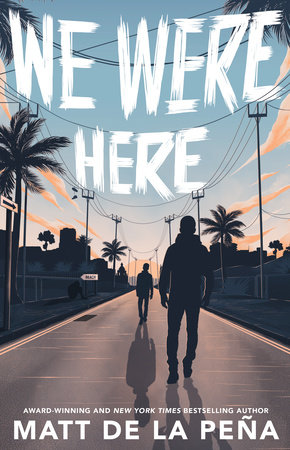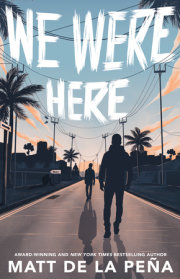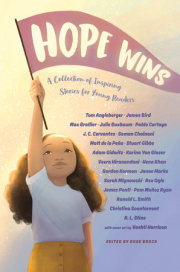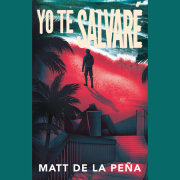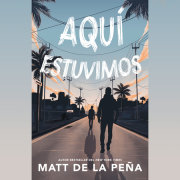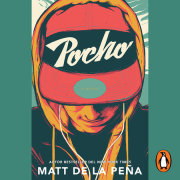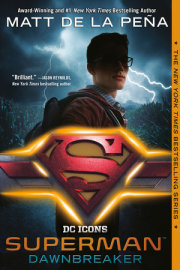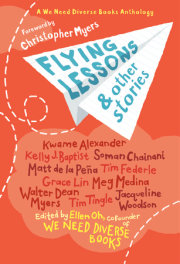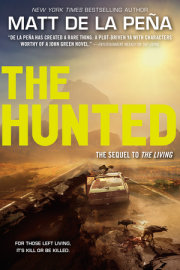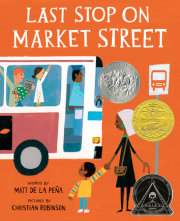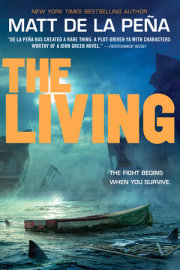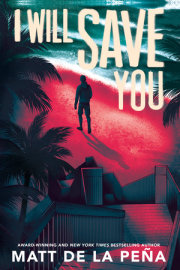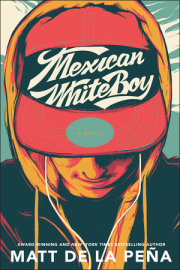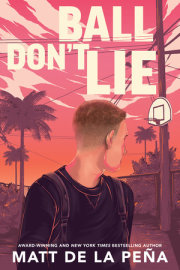May 13
Here’s the thing: I was probably gonna write a book when I got older anyways. About what it’s like growing up on the levee in Stockton, where every other person you meet has missing teeth or is leaning against a liquor store wall begging for change to buy beer. Or maybe it’d be about my dad dying in the stupid war and how at the funeral they gave my mom some cheap medal and a folded flag and shot a bunch of rifles at the clouds. Or maybe the book would just be something about me and my brother, Diego. How we hang mostly by ourselves, pulling corroded-looking fish out of the murky levee water and throwing them back. How sometimes when Moms falls asleep in front of the TV we’ll sneak out of the apartment and walk around the neighborhood, looking into other people’s windows, watching them sleep.
That’s the weirdest thing, by the way. That every person you come across lays down in a bed, under the covers, and closes their eyes at night. Cops, teachers, parents, hot girls, pro ballers, everybody. For some reason it makes people seem so much less real when I look at them.
Anyways, at first I was worried standing there next to the hunchback old man they gave me for a lawyer, both of us waiting for the judge to make his verdict. I thought maybe they’d put me away for a grip of years because of what I did. But then I thought real hard about it. I squinted my eyes and concentrated with my whole mind. That’s something you don’t know about me. I can sometimes make stuff happen just by thinking about it. I try not to do it too much because my head mostly gets stuck on bad stuff, but this time something good actually happened: the judge only gave me a year in a group home. Said I had to write in a journal so some counselor could try to figure out how I think. Dude didn’t know I was probably gonna write a book anyways. Or that it’s hard as hell bein’ at home these days, after what happened. So when he gave out my sentence it was almost like he didn’t give me a sentence at all.
I told my moms the same thing when we were walking out of the courtroom together. I said, “Yo, Ma, this isn’t so bad, right? I thought those people would lock me up and throw away the key.”
She didn’t say anything back, though. Didn’t look at me either. Matter of fact, she didn’t look at me all the way up till the day she had to drive me to Juvenile Hall, drop me off at the gate, where two big beefy white guards were waiting to escort me into the building. And even then she just barely glanced at me for a split second. And we didn’t hug or anything. Her face seemed plain, like it would on any other day. I tried to look at her real good as we stood there. I knew I wasn’t gonna see her for a while. Her skin was so much whiter than mine and her eyes were big and blue. And she was wearing the fake diamond earrings she always wears that sparkle when the sun hits ’em at a certain angle. Her blond hair all pulled back in a ponytail.
For some reason it hit me hard right then—as one of the guards took me by the arm and started leading me away—how mad pretty my mom is. For real, man, it’s like someone’s picture you’d see in one of them magazines laying around the dentist’s office. Or on a TV show. And she’s actually my moms.
I looked over my shoulder as they walked me through the gate, but she still wasn’t looking at me. It’s okay, though. I understood why.
It’s ’cause of what I did.
June 1
I’ll put it to you like this: I’m about ten times smarter than everyone in Juvi. For real. These guys are a bunch of straight-up dummies, man. Take this big black kid they put me in a cell with, Rondell. He can’t even read. I know ’cause three nights ago he stepped to me when I was writing in my journal. He said: “Yo, Mexico, wha’chu writin’ ’bout in there?”
“Whatever I wanna write about,” I said without looking up. “How ’bout them apples, homey?”
He paused. “What you just said?”
I shook my head, told him: “And Mexico’s a pretty stupid thing to call me, by the way, considering I’ve never even been to Mexico.”
His ass stood there a quick sec, thinking about what I’d just said to him—or at least trying. Then he bum-rushed me. Shoved me right off my chair and onto the ground, pressed his giant grass-stained shoe down on my neck. He said: “Don’t you never talk like that to Rondell again. You hear? Nobody talk to Rondell like that.”
I tried to nod, but he had my neck pinned, so I couldn’t really move my head. Couldn’t make a sound either. Or breathe too good.
He swiped my journal off the table and stared at the page I was writing, his kick weighing down on my neck. And I’m not gonna lie, man, I got a little spooked. Rondell’s a freak for a sixteen-year-old: six foot something with huge-ass arms and legs and a face that already looks like he’s a grown man. And I’d just written some pretty bad stuff about him in my journal. Called him a retarded ape who smelled like when a rat dies in the wall of your apartment. But at the same time I almost wanted Rondell to push down harder with his shoe. Almost wanted him to crush my neck, break my windpipe, end my stupid-ass journal right then and there. I started imagining the shoe pushing all the way through, rubber hitting cement. Them telling my moms what happened as she stood with the phone cupped to her ear in the kitchen, crying but at the same time looking sort of relieved, too.
After a couple minutes like that—Rondell staring at the page I’d been writing and me pinned to the nasty cement floor of our cell—he tossed the journal back on the table and took his foot off my neck.
And that’s how I knew he couldn’t read. Dude was staring right at the sentences I’d just written about him, right? And he didn’t do nothin’. Just hopped up on his bunk, linked his fingers behind his head and stared at the paint-chipped ceiling.
Copyright © 2009 by Matt de la Pena. All rights reserved. No part of this excerpt may be reproduced or reprinted without permission in writing from the publisher.

